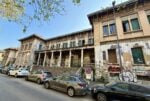Matteo Cremonesi e Domenico Antonio Mancini – Garten
.jpg)
La Fondazione Arthur Cravan è lieta di presentare Garten l’installazione realizzata a quattro mani.
Comunicato stampa
Il Reno scorreva fra teneri vapori, ancora una volta il cielo risplendeva, il bosco era profumato. L’angolo più appartato di una lontana panchina ci accolse: qui ci sedemmo quasi nascondendoci, in un modo che né il filosofo né il suo accompagnatore potessero vederci in volto. Eravamo soli; la voce del filosofo, quando giungeva smorzata sino a noi, si era già quasi trasformata in una musica naturale, attraverso il movimento appena percettibile del fogliame, attraverso il mormorio e il sussurro di mille esistenze formicolanti su in alto nella foresta.
Friedrich Nietzsche, Sull’avvenire delle nostre scuole.
La Fondazione Arthur Cravan è lieta di presentare Garten l’installazione realizzata a quattro mani da Matteo Cremonesi e Domenico Antonio Mancini, con un contributo di Alberto Franceschini.
Ospitata nei nuovi spazi della Fondazione in via Aleardo Aleardi l’opera si compone di tre elementi scultorei in ceramica nera dal cui interno è trasmessa la registrazione audio di un estratto da Sull’avvenire delle nostre scuole di Friedrich Nietzsche. A dar voce al complesso scultoreo e alle parole del filosofo tedesco è Alberto Franceschini, figura la cui vicenda politica ed umana testimonia la possibilità di esprimere una posizione contraria alla struttura disciplinante dell'organizzazione economica e lavorativa della società.
All’inizio del 1872, quando Nietzsche, da poco ventisettenne, si accinge a tenere un ciclo di conferenze dal titolo Sull’avvenire delle nostre scuole, per incarico della “Società Accademica”, ha da poco concluso La Nascita della tragedia. Consapevole di aver compiuto un’opera decisiva, nonché un passo importante verso la messa in discussione dei valori e dei giudizi dominanti al tempo, egli riferisce di sentirsi vecchio, sfinito, svuotato. Gli sembra che sia passata un’eternità dagli anni in cui era ancora studente: per un momento Nietzsche fa riposare la sua volontà, si guarda attorno con nostalgia evocando gli anni dello studentato nella speranza di recuperare ancora qualcosa di quel tempo. Con questo stato d’animo il filosofo tedesco prepara le conferenze, nelle quali procede alla formulazione di un’accusa feroce e irriducibile al cui cuore troviamo la contrapposizione fra Cultura e Stato e lo svolgimento di quella radicale inimicizia che esiste fra queste due potenze.
In questo discorso, di triste attualità, Nietzsche afferma che a causa dell’indebolimento e della specializzazione dell’istruzione, la cultura soccombe di fronte allo Stato, divenendo una pratica disciplinante subordinata alla vocazione di istruire non tanto dei liberi pensatori, ma piuttosto degli arrendevoli impiegati del discorso culturale, soggetti pronti, allora come oggi, ad interpretare la loro parte in un'organizzazione economica.
Gli elementi scultorei disposti nello spazio insieme alla voce di Alberto Franceschini che legge le parole di Nietzsche, e persino l’atmosfera evocata nello stesso testo, disegnano un ambiente di sosta, il giardino evocato dal titolo dell'esposizione. Garten offre un momento di pausa, uno spazio d’ascolto a partire dal quale interrogarsi rispetto al complesso rapporto che vede contrapporre l’esperienza culturale al linguaggio ossequente, alla produzione e al lavoro.
L’installazione è formalmente essenziale: l’attenzione dello spettatore non si focalizza sulla forma che abita lo spazio ma sulla condizione che a partire da questi oggetti si articola.
ENG
The Rhine flowed through tender vapours, once again the sky shone, the wood was perfumed. The most secluded corner of a distant bench welcomed us: here we sat, almost hiding, in such a way that neither the philosopher nor his companion could see our faces. We were alone; the philosopher's voice, when it reached us in a muffled voice, had already almost turned into a natural music, through the barely perceptible movement of the foliage, through the murmur and whisper of a thousand existences tingling high up in the forest.
Friedrich Nietzsche, On the Future of Our Educational Institutions
The Arthur Cravan Foundation is pleased to present Garten, an installation created by Matteo Cremonesi and Domenico Antonio Mancini, with a contribution by Alberto Franceschini.
Hosted in the new spaces of the Foundation in via Aleardo Aleardi, the work consists of three sculptural elements in black ceramic from the inside of which an audio recording of an excerpt from Friedrich Nietzsche's On the Future of Our Educational Institutions is transmitted. Alberto Franceschini gives voice to the sculptural complex and the words of the German philosopher, a figure whose political and human life bears witness to the possibility of expressing a position opposed to the disciplinary structure of society's economic and labour organisation.
At the beginning of 1872, when Nietzsche, who had just turned 27, was about to hold a series of conferences entitled On the Future of Our Educational Institutions, commissioned by the "Academic Society", he had just finished The Birth of Tragedy. Aware of having completed a decisive work and an important step towards questioning the values and judgments that dominated at the time, he says he feels old, exhausted and empty. It seems to him that an eternity has passed since the years when he was still a student: for a moment Nietzsche lets his will rest, he looks around nostalgically evoking his student years in the hope of recovering something of that time. It is with this state of mind that the German philosopher prepares his lectures, in which he proceeds to formulate a fierce and irreducible accusation at the heart of which we find the opposition between Culture and the State and the development of the radical enmity that exists between these two powers.
In this discourse, which is sadly topical, Nietzsche asserts that due to the weakening and specialisation of education, culture succumbs to the State, becoming a disciplining practice subordinated to the vocation of educating not so much free thinkers as surrendered employees of cultural discourse, subjects ready, then as now, to play their part in an economic organisation.
The sculptural elements arranged in the space, together with the voice of Alberto Franceschini reading Nietzsche's words, and even the atmosphere evoked in the text itself, create an environment of pause, the garden evoked by the title of the exhibition. Garten offers a moment of pause, a listening space from which to question the complex relationship between cultural experience and obsequious language, production and work.
The installation is formally essential: the viewer's attention is not focused on the form that inhabits the space but on the condition that is articulated from these objects.



